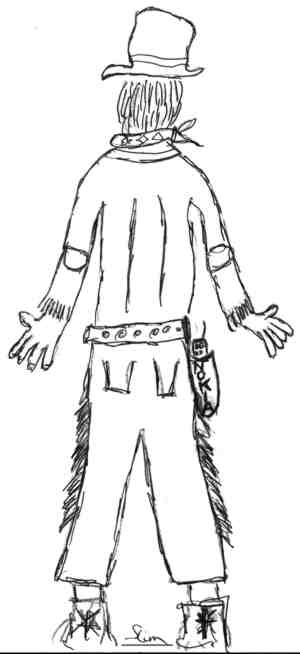Letter from Slim Wolfe
Rural Life – September 2005 – Colorado Central Magazine
Martha,
Thanks for allowing space for me to express opinions different than your own, but your rebuttal (August) seems more based on your own construction and less on what I wrote or implied. Re-read my words, please. Here’s what I didn’t say.

I did not say that everyone must be, act, and think alike, or that everyone ought to live out a Robinson Crusoe or a Mother Earth News lifestyle. I didn’t say or imply that everyone ought to leave the cities and return to the land. I know the perspective on the human/commodity chain I’m offering may be a bit scary to you live-in-a-box, shop-in-a-box people, but your twisting of my message was downright Orwellian – or Bushwellian.
A simpler life predates the Mother Earth News by at least ten thousand years. People didn’t think, be, or act the same during all that time, the more so because their thoughts weren’t formed by global information networks, perhaps, and because the artifacts of living were less standardized and mass-produced. They had a more personal, fulfilling relationship with the world, and a more economically sustainable one, since their steaks and chickens weren’t hauled for miles on end in refrigerated diesel-guzzlers.
Despite your fears that hordes of people will bail out of urban areas and wreak havoc on our rural balance, it might be argued that they couldn’t possibly be doing more harm than they are now, helpless to control the gaggle of umbilical cords required for survival. But that’s not what I said. Barring some sort of revolutionary land redistribution, city-dwellers will probably remain on the increase (even those who read my exhortations) but they might find ways to be self-sustaining in their urban context – as might you Salidans, if you’d only take the trouble to read my previous message for what it was worth.
And speaking of sustainability, the editor’s assertion (in her rebuttal) that musicians and artists are sustaining themselves seems to miss the concept of sustainability in the ecological sense. Sure, they’re making a living, monetarily, we hope but so does a ditchdigger. To be ecologically, planetarily sustaining, a potter for example would carefully manage and harvest a clay-bog and wildcraft pigments, rather than depending on mass production and the trucking in of raw materials; likewise a drummer would make drums from logs taken from the woods. We have a few such in our community, but hardly enough.
Does that mean we all have to think and act alike? Hardly, but it does mean that we all ought to think about sustainability as opposed to money in and money out. I did not mean that each and every one must live apart, bake bread apart, and never cooperate. But we ought to think about the energy-efficiency of shipping flour versus perishable bread and the rewards of the hands-on-experience. And we all ought to realize that our umbilical cords may get cut (Y2K in bits and pieces) and we might want to learn how to shovel our way to tomorrow. Organize, vote, and be supportive, sure, but if that was enough to fix us we would have been fixed long ago. The wolf is at the door, and won’t be appeased by bones.
Slim Wolfe
Villa Grove
Slim,
I apologize if I misinterpreted something you said or came on too strong. But I still think you show unreasonable contempt for people who live in cities, or work in factories, or dwell in small towns doing ordinary jobs for less than ordinary wages.
You show such disdain for electronic connections, but I’m convinced that they cut waste in our business. Ed and I used to drive to Denver to search archives, now they’re available online. We do editing by email, send pages to the printer electronically, and thereby save time, paper and gasoline. Now we can produce the magazine (and hold other jobs), yet use less than 16 gallons of gasoline per month on average. To do that, however, we have to live in town.
Furthermore, I suspect that people living in rooming houses in New York City are more ecologicaly sound than either you or me, since they don’t take up much space, own much, or disrupt wildlife corridors. (Or produce magazines, for that matter.)
I’ll admit that there are probably spiritual advantages to growing your own, but we live in a region of little rain, and fragile wetlands and tundra. Thus, I think one of the reasons you can live your lifestyle here, is because most of the 290 million other Americans would rather live in towns — and for that I think we should be grateful.
Anyway, I just don’t believe that our forests and countryside can supply everyone with free wood, food, building materials, and enough space for chickens, crops, and solar panels. (But it occurs to me that this is really about just how much human usage our region can endure and about what kind of city/rural division is most sustainable, and I am certainly no expert, so perhaps it would help if some other people weighed in.)
In regard to your current contention that life was better once upon a time and people were more fulfilled, I doubt that. On the contrary, in eras plagued by smallpox, witch burnings, inquisitions, and illiteracy, I think the wolf was really at the door, quite literally. Today, he’s probably only lurking nearby because he thinks we might all kill each other and leave him the bones–and we might.
In the meatime, let’s enjoy this place and its open spaces.
M.Q. Orwell-Bush
P.S. Come by some time and I will take your picture with my deviously decadent digital camera.


